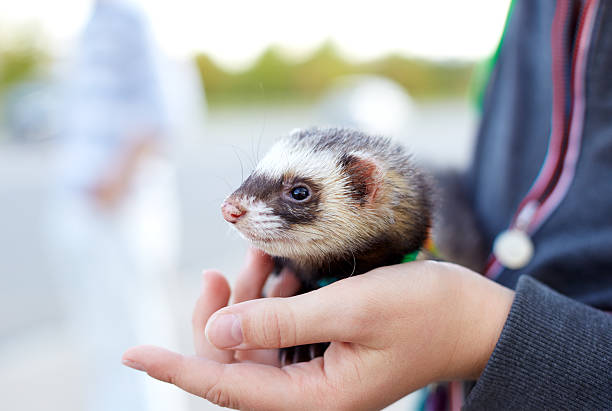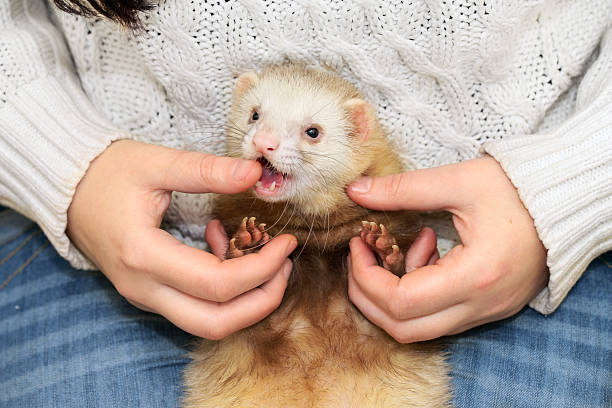Ferret Playtime – Fun Games and Activities to Keep Them Happy
This post contains affiliate links. This means I will make a commission at no extra cost to you should you click through and make a purchase. Read the full disclosure here.
Ferrets are renowned for their boundless energy, playful antics, and mischievous personalities. As ferret owners, we have the privilege of sharing our lives with these captivating creatures, and one of the most enjoyable aspects of ferret ownership is playtime. In this blog post, we will delve into the exciting world of ferret playtime, exploring a variety of games and activities that will not only keep your furry friends entertained but also strengthen the bond between you and your ferrets.
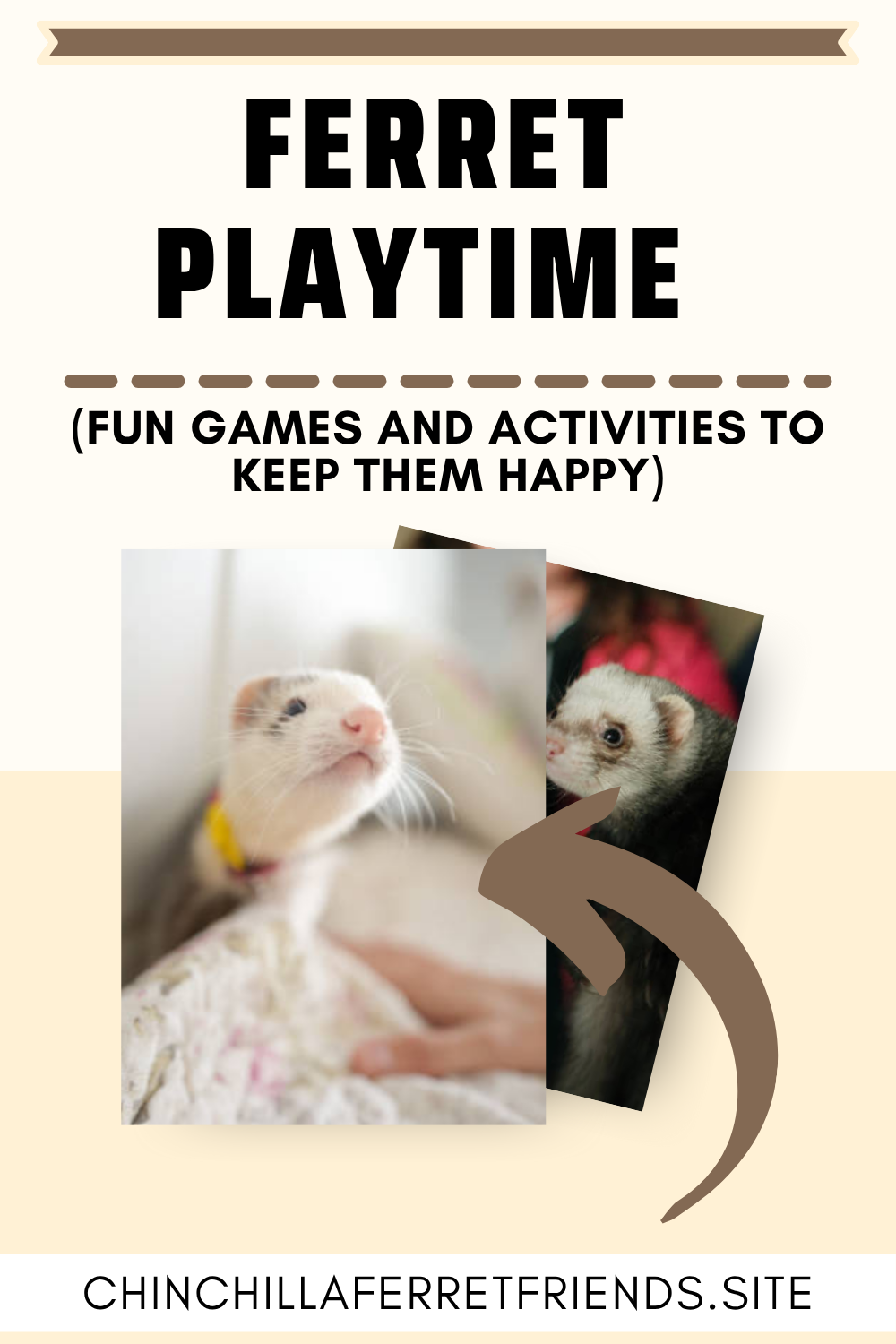
The Significance of Playtime for Ferrets
Playtime is not just a source of entertainment; it’s a fundamental component of a ferret’s life. These curious and social animals possess natural instincts that thrive through play. Here’s why playtime is crucial for your ferrets:
1. Physical Exercise:
- Ferrets are highly active animals. Playtime provides them with much-needed exercise to keep their bodies fit and healthy.
2. Mental Stimulation:
- Ferrets are intelligent creatures. Playtime challenges their minds, preventing boredom and promoting mental well-being.
3. Bonding Opportunity:
- Playtime is a chance for you to strengthen the bond with your ferrets. It builds trust and affection between you and your furry companions.
4. Behavioral Health:
- Regular playtime reduces the risk of behavioral issues, as bored ferrets are more likely to engage in undesirable behaviors like nipping or digging.
Why Playtime Is Crucial for Ferrets
Ferrets are natural-born explorers and thrill-seekers, and playtime is their passport to adventure. Beyond the sheer joy and entertainment it brings, playtime serves several vital functions in the life of a ferret. Let’s explore why dedicating time for play is a non-negotiable aspect of ferret ownership:
Instinctual Behaviors

Ferrets exhibit a range of instinctual behaviors that are deeply rooted in their nature:
1. Hunting Instinct: In the wild, ferrets are skilled hunters. They love to stalk, pounce, and chase, and playtime allows them to express and satisfy these instincts in a safe and controlled environment.
2. Exploration: Ferrets are natural explorers. They crave novelty and adventure, making playtime a perfect outlet for their inquisitive natures.
3. Social Interaction: Ferrets are social animals that thrive on interaction with their human caregivers and fellow ferrets. Playtime is an opportunity for bonding and socializing.
Physical Exercise

Ferrets are known for their boundless energy, and regular physical exercise is essential for their overall health:
1. Muscle Tone: Playtime helps ferrets maintain strong muscles and prevents obesity, a common issue in less active pets.
2. Cardiovascular Health: Active play gets their heart rates up, contributing to a healthy cardiovascular system.
3. Flexibility: Through play, ferrets engage in various movements, promoting flexibility and agility.
Mental Stimulation

The mental health of your ferret is as important as their physical well-being:
1. Cognitive Development: Playtime challenges your ferret’s cognitive abilities, such as problem-solving and spatial awareness.
2. Preventing Boredom: Boredom can lead to destructive behaviors. Playtime keeps their minds engaged and reduces the risk of destructive tendencies.
Behavior and Bonding

A harmonious relationship between you and your ferret is fostered through play:
1. Behavioral Health: Active playtime diminishes behavioral issues such as nipping, digging, or restlessness, which can arise from boredom.
2. Bonding Time: Playtime is an excellent opportunity to connect with your ferret on a deeper level. The trust and affection that develop during these moments are priceless.
In essence, playtime is not just fun; it’s a fundamental aspect of ensuring the happiness, health, and well-rounded development of your ferret.

Safety First: Preparing the Play Area
Before diving into the world of ferret playtime, it’s crucial to create a safe and ferret-proof environment. While ferrets are curious and agile, they can sometimes find themselves in precarious situations. Taking the necessary precautions ensures that playtime is not only fun but also secure for your furry companions.
The Ferret-Proofed Play Space

- Choose a Secure Room: Select a designated play area, preferably a room that can be ferret-proofed. Bathrooms or spare bedrooms often work well.
- Check for Hazards: Get down on your hands and knees to view the space from your ferret’s perspective. Look for small openings, gaps, or potential hiding spots where a ferret could get stuck.
- Block Escape Routes: Ensure that doors, windows, and any other escape routes are securely closed or blocked. Ferrets are skilled escape artists.
- Secure Electrical Cords: Ferrets may chew on cords, posing an electrical hazard. Use cord protectors or conceal cords out of reach.
- Remove Toxic Plants and Chemicals: Check the play area for any toxic plants or chemicals, and remove them from reach.
Hide Dangerous Objects
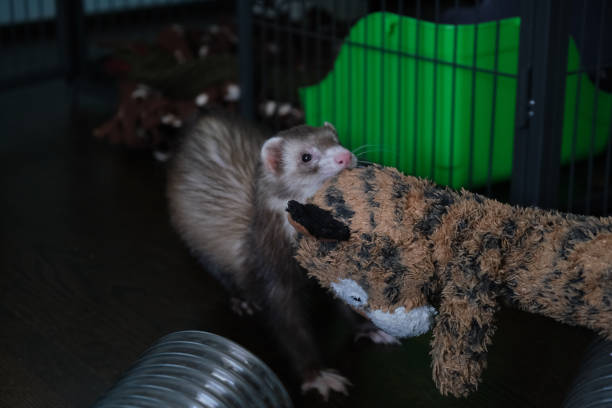
- Small Objects: Pick up small objects that could be swallowed or choked on. Ferrets are notorious for finding and hoarding small items.
- Chemicals and Cleaning Supplies: Store chemicals and cleaning supplies safely out of reach. Ferrets are curious and may investigate these substances.
- Toxic Foods: Ferrets should not have access to human food, especially chocolate, caffeine, and foods high in sugar.
Supervision Is Key

- Never Leave Unattended: Never leave your ferrets unattended during playtime. Even in a ferret-proofed area, they can get into unexpected situations.
- Watch for Signs of Trouble: Keep a close eye on your ferrets. Look for any signs of distress or unusual behavior.
- Monitor Playmates: If you have multiple ferrets, watch their interactions closely to ensure play remains friendly.
Taking these safety precautions ensures that playtime is not only enjoyable but also worry-free for both you and your ferrets. Once you’ve established a secure play area, you’re ready to explore a variety of interactive games and mental stimulation activities that will keep your ferrets entertained and engaged.
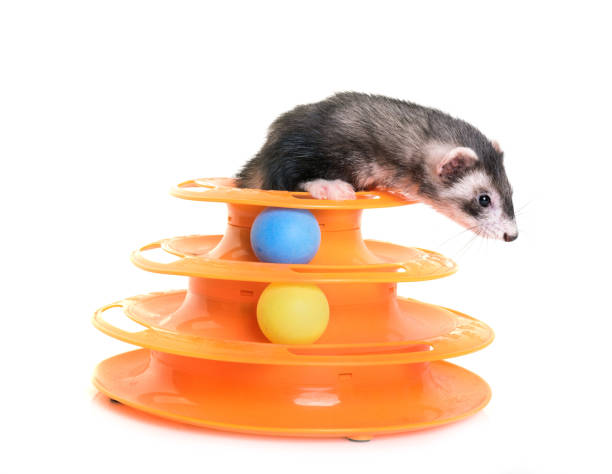
Interactive Playtime Ideas
Now that you’ve created a safe play area for your ferrets, it’s time to dive into the exciting world of interactive playtime. Ferrets are natural-born explorers and thrill-seekers, making them enthusiastic participants in a variety of games. Here are some fun and engaging activities to share with your furry friends:
Ferret Hide and Seek:

How to Play:
- Use tunnels, boxes, and blankets to create hiding spots within the play area.
- Encourage your ferret to explore these hiding spots.
- Gently call their name or make a playful noise to invite them to find you.
Why It’s Fun:
- Ferrets love the thrill of discovery, and this game taps into their curiosity.
- It enhances their problem-solving skills as they figure out where you’re hiding.
Ferret Fetch:

How to Play:
- Choose a small, lightweight toy that your ferret can carry.
- Toss the toy gently, and encourage your ferret to retrieve it.
- Use treats or positive reinforcement to reward them when they bring it back.
Why It’s Fun:
- Ferrets enjoy chasing and retrieving objects, similar to a dog playing fetch.
- It provides physical exercise and mental stimulation.
Tug of War:

How to Play:
- Use a soft, ferret-safe toy or a rope.
- Engage in a gentle tug of war with your ferret.
- Allow them to “win” occasionally to keep the game exciting.
Why It’s Fun:
- Tug of war satisfies their natural instinct to wrestle and play-fight.
- It’s a bonding experience that builds trust and affection.
Ferret Puzzle Toys:

How to Play:
- Introduce puzzle toys designed for ferrets, such as treat-dispensing balls.
- Fill the toy with treats and let your ferret figure out how to get them out.
Why It’s Fun:
- Puzzle toys challenge their problem-solving skills and keep them mentally engaged.
- It offers a rewarding experience as they work for their treats.
Ferret Agility Course:

How to Play:
- Set up a mini agility course using tunnels, ramps, and platforms.
- Encourage your ferret to navigate the course using treats or toys as incentives.
Why It’s Fun:
- Ferrets are naturally agile and enjoy climbing and exploring.
- An agility course provides physical exercise and mental stimulation.
Interactive playtime not only keeps your ferrets physically and mentally active but also strengthens your bond with them. Remember to be patient and adapt these activities to suit your ferret’s preferences and energy levels.

Mental Stimulation Activities
In addition to interactive playtime, mental stimulation activities are a fantastic way to keep your ferrets engaged, challenged, and mentally sharp. These activities tap into their natural curiosity and intelligence, providing them with hours of entertainment. Here are some mental stimulation activities to enrich your ferret’s playtime:
Ferret Scavenger Hunt:

How to Play:
- Hide small treats or favorite toys throughout the play area.
- Encourage your ferret to use their keen sense of smell to find the hidden treasures.
Why It’s Fun:
- Ferrets love to explore and hunt, making this activity exciting and rewarding.
- It stimulates their senses and provides a mental challenge.
Treasure Box Play:

How to Play:
- Create a “treasure box” filled with safe items like crinkly paper, soft balls, or fabric scraps.
- Let your ferret explore the contents of the box.
Why It’s Fun:
- Ferrets are naturally curious and will investigate the items in the box.
- It offers tactile stimulation and keeps them engaged.
Interactive Feeding Toys:
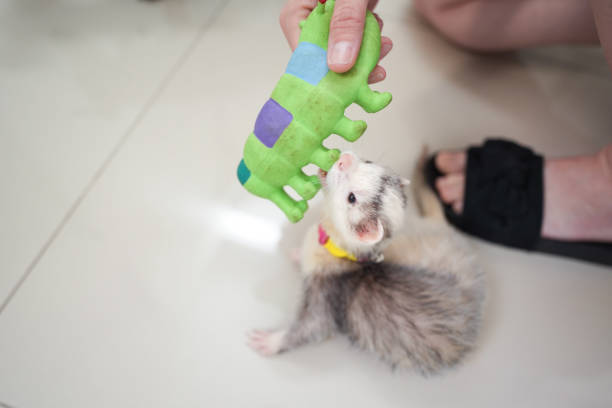
How to Play:
- Use interactive feeding toys, such as puzzle feeders or treat-dispensing balls.
- Fill the toys with your ferret’s kibble or treats.
Why It’s Fun:
- These toys require problem-solving to access the food, keeping your ferret mentally active.
- They mimic natural foraging behaviors.
Paper Bag Play:

How to Play:
- Place a paper bag in the play area.
- Allow your ferret to explore, hide in, and play with the bag.
Why It’s Fun:
- Ferrets enjoy the crinkly texture and tunnel-like structure of paper bags.
- It provides a simple yet stimulating playtime option.
Mirror Play:

How to Play:
- Set up a small, ferret-safe mirror in the play area.
- Observe your ferret’s reaction as they interact with their “reflection.”
Why It’s Fun:
- Ferrets often find their own reflection intriguing and may engage in playful antics.
- Mirror play can be both entertaining and mentally stimulating.
These mental stimulation activities are excellent additions to your ferret’s playtime routine. They not only keep your ferret mentally sharp but also provide variety and excitement to their day. Experiment with different activities to discover which ones your ferret enjoys the most.
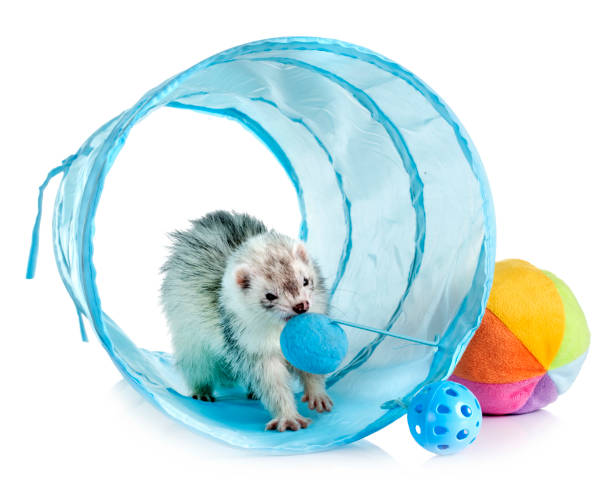
The Importance of Rotating Toys and Activities
Just like us, ferrets can become bored with the same activities and toys if they’re offered repeatedly. To keep playtime exciting and mentally stimulating, it’s essential to rotate toys and activities regularly. Here’s why diversity in play is crucial for your ferret’s happiness:
Preventing Boredom
Ferrets are highly intelligent and inquisitive animals. Offering the same toys or activities repeatedly can lead to boredom, which may result in:
- Destructive behaviors like chewing on furniture or objects.
- Increased restlessness and agitation.
- A decline in interest during playtime.
By introducing new toys and activities, you keep their minds engaged and prevent the onset of boredom-related issues.
Encouraging Exploration
Ferrets thrive on novelty and exploration. Rotating toys and activities allows them to:
- Continually discover new textures, scents, and challenges.
- Stay mentally and physically active as they engage with different items.
- Maintain their natural curiosity and enthusiasm for play.
Strengthening the Bond
Variety in playtime keeps things fresh for both you and your ferrets. It provides opportunities to:
- Bond with your ferret over shared experiences.
- Discover new games and activities together.
- Reinforce the trust and affection between you and your furry companions.
Tailoring to Their Interests
Ferrets have individual preferences. By rotating toys and activities, you can:
- Identify which toys or games your ferret enjoys the most.
- Tailor playtime to their specific interests.
- Ensure that they remain excited and engaged during play.
Preventing Toy Fatigue
Like children who tire of their toys after extended use, ferrets can experience “toy fatigue.” Regularly introducing different toys can:
- Renew your ferret’s interest in their playthings.
- Extend the lifespan and appeal of their toys.
- Keep playtime consistently enjoyable.
To keep playtime fresh, set aside a collection of toys and activities and rotate them in and out of your ferret’s play area regularly. Observe their reactions and preferences to determine which toys and games they favor. By providing a diverse and ever-changing playtime environment, you’ll ensure that your ferrets remain entertained, mentally stimulated, and happy during their play sessions.
Troubleshooting Common Playtime Challenges
While playtime with your ferrets is generally a joyful and enriching experience, it’s important to be aware of potential challenges that may arise. Addressing these issues proactively can help ensure that playtime remains safe and enjoyable for both you and your furry friends. Here are some common playtime challenges and strategies for dealing with them:
Play Aggression
Challenge: Some ferrets may exhibit play aggression during playtime, which can involve biting, nipping, or rough play that becomes too intense.
Solution:
- Training: Use positive reinforcement training to teach your ferret appropriate play behavior. Reward gentle play and redirect them when play becomes too rough.
- Time-Outs: If play aggression continues, give your ferret a short time-out in their cage to calm down.
- Limit Rough Play: Avoid engaging in games that encourage overly aggressive behavior, such as wrestling or teasing.
Fear or Shyness
Challenge: Some ferrets may be timid or fearful during playtime, particularly if they are new to your home or have had negative experiences in the past.
Solution:
- Gradual Introduction: If your ferret is shy, introduce them to playtime gradually. Start with shorter sessions and gradually extend the duration.
- Positive Associations: Use treats and gentle encouragement to create positive associations with playtime.
- Patience: Be patient and allow your ferret to acclimate to their new environment and routine.
Over-Excitement
Challenge: Ferrets can become overly excited during play, which may lead to erratic behavior and accidents.
Solution:
- Provide Breaks: If your ferret becomes too excited, take short breaks during playtime to allow them to calm down.
- Structured Play: Incorporate structured activities like hide and seek or puzzle toys to channel their excitement into focused play.
- Supervision: Maintain a watchful eye to ensure their safety and intervene if necessary.
Territorial Behavior
Challenge: Ferrets can be territorial, which may lead to disputes or aggression between ferrets during playtime.
Solution:
- Supervised Play: Supervise playtime between multiple ferrets to prevent conflicts. Separate them if necessary.
- Provide Separate Spaces: Offer each ferret their play area if territorial issues persist.
- Spaying and Neutering: Consider spaying and neutering your ferrets, as this can reduce territorial behaviors.
Health Concerns
Challenge: Occasionally, health issues can impact a ferret’s ability to enjoy playtime, such as pain or illness.
Solution:
- Regular Vet Check-Ups: Schedule regular veterinary check-ups to ensure your ferret is in good health.
- Watch for Signs: Be vigilant for signs of discomfort or distress during playtime, such as limping or lethargy.
- Consult a Veterinarian: If you suspect health issues, consult your veterinarian for a thorough examination and guidance.
Addressing these common playtime challenges with patience, training, and awareness can help create a positive and enjoyable playtime experience for your ferrets. Remember that every ferret is unique, and understanding their individual needs and behaviors is key to fostering a loving and rewarding relationship during playtime and beyond.

Conclusion: Happy and Enriching Ferret Playtime
Ferret playtime is a delightful and essential aspect of ferret ownership. It’s an opportunity to witness the boundless energy, intelligence, and charm of these captivating creatures. By providing engaging and mentally stimulating activities, you not only keep your ferrets happy and healthy but also strengthen the bond between you and your furry friends.






